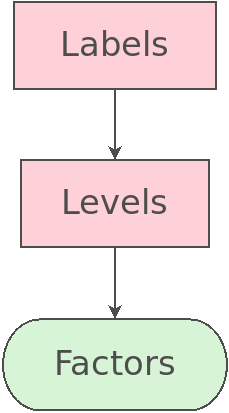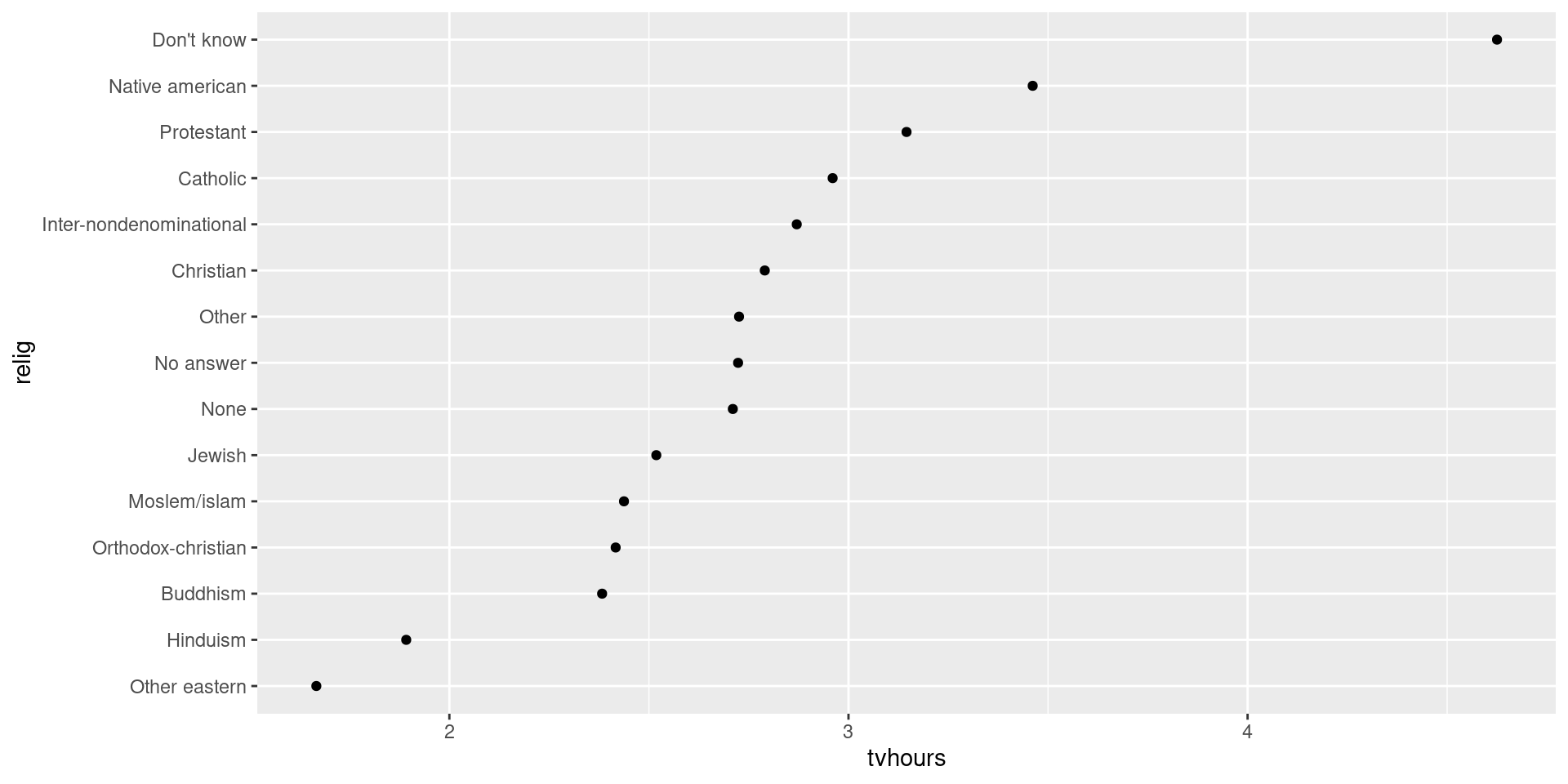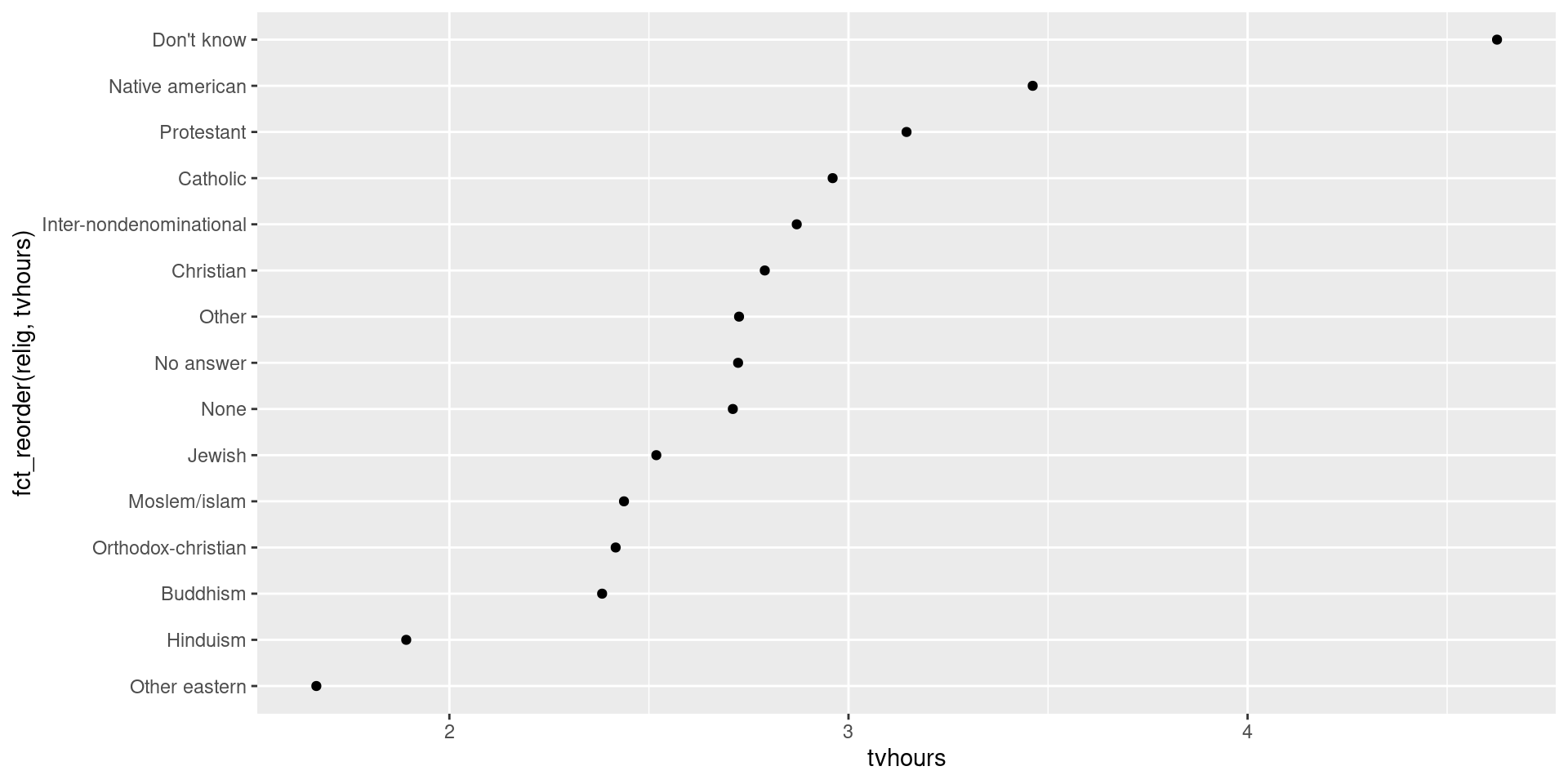Factors
Jeff Stevens
2023-03-20
Introduction
The problem
What is needed to create data2 from data1?
data1# A tibble: 8 × 2
species n
<chr> <int>
1 Droid 6
2 Gungan 3
3 Human 35
4 Kaminoan 2
5 Mirialan 2
6 Twi'lek 2
7 Wookiee 2
8 Zabrak 2data2# A tibble: 4 × 2
species n
<fct> <int>
1 Human 35
2 Other 10
3 Android 6
4 Gungan 3Factors
Categorical variables represented by augmented integers
Mental model

View/set factor levels
Label factors
labels argument
[1] April June October January
Levels: April January June OctoberNote
Note you have to label them in the order they appear as levels.
Factors with {forcats}


Data set
gss_cat# A tibble: 21,483 × 9
year marital age race rincome partyid relig denom tvhours
<int> <fct> <int> <fct> <fct> <fct> <fct> <fct> <int>
1 2000 Never married 26 White $8000 to 9999 Ind,near … Prot… Sout… 12
2 2000 Divorced 48 White $8000 to 9999 Not str r… Prot… Bapt… NA
3 2000 Widowed 67 White Not applicable Independe… Prot… No d… 2
4 2000 Never married 39 White Not applicable Ind,near … Orth… Not … 4
5 2000 Divorced 25 White Not applicable Not str d… None Not … 1
6 2000 Married 25 White $20000 - 24999 Strong de… Prot… Sout… NA
7 2000 Never married 36 White $25000 or more Not str r… Chri… Not … 3
8 2000 Divorced 44 White $7000 to 7999 Ind,near … Prot… Luth… NA
9 2000 Married 44 White $25000 or more Not str d… Prot… Other 0
10 2000 Married 47 White $25000 or more Strong re… Prot… Sout… 3
# … with 21,473 more rowsReordering factor levels
Check level order
levels(y1)[1] "Apr" "Jan" "Jun" "Oct"Note
By default, level elements are sorted alphabetically.
Check level order with pipes
marital <- gss_cat |>
pull(marital)
marital |> levels()[1] "No answer" "Never married" "Separated" "Divorced"
[5] "Widowed" "Married" Note
Here, order was determined already.
Reordering levels
In the order present in the data with fct_inorder()
head(marital, 20) [1] Never married Divorced Widowed Never married Divorced
[6] Married Never married Divorced Married Married
[11] Married Married Married Married Divorced
[16] Married Widowed Never married Married Married
Levels: No answer Never married Separated Divorced Widowed Marriedmarital |> fct_inorder() |>
levels()[1] "Never married" "Divorced" "Widowed" "Married"
[5] "Separated" "No answer" Reordering levels
In the order based on number of observations of each level with fct_infreq()
gss_cat |>
count(marital, sort = TRUE)# A tibble: 6 × 2
marital n
<fct> <int>
1 Married 10117
2 Never married 5416
3 Divorced 3383
4 Widowed 1807
5 Separated 743
6 No answer 17marital |> fct_infreq() |>
levels()[1] "Married" "Never married" "Divorced" "Widowed"
[5] "Separated" "No answer" Reordering levels
In reverse order of factor levels with fct_rev()
Manually reorder factor levels
(relig_summary <- gss_cat |>
group_by(relig) |>
summarise(
tvhours = mean(tvhours, na.rm = TRUE),
n = n()))# A tibble: 15 × 3
relig tvhours n
<fct> <dbl> <int>
1 No answer 2.72 93
2 Don't know 4.62 15
3 Inter-nondenominational 2.87 109
4 Native american 3.46 23
5 Christian 2.79 689
6 Orthodox-christian 2.42 95
7 Moslem/islam 2.44 104
8 Other eastern 1.67 32
9 Hinduism 1.89 71
10 Buddhism 2.38 147
11 Other 2.73 224
12 None 2.71 3523
13 Jewish 2.52 388
14 Catholic 2.96 5124
15 Protestant 3.15 10846Manually reorder factor levels
relig_summary |> ggplot(aes(x = tvhours, y = relig)) +
geom_point()
Manually reorder factor levels
relig_summary_releveled <- relig_summary |>
mutate(relig = fct_relevel(relig, c("None", "Other"), after = 2))
levels(relig_summary_releveled$relig) [1] "No answer" "Don't know"
[3] "None" "Other"
[5] "Inter-nondenominational" "Native american"
[7] "Christian" "Orthodox-christian"
[9] "Moslem/islam" "Other eastern"
[11] "Hinduism" "Buddhism"
[13] "Jewish" "Catholic"
[15] "Protestant" "Not applicable" Manually reorder factor levels
relig_summary_releveled |> ggplot(aes(x = tvhours, y = relig)) +
geom_point()
Order factors by another variable
relig_summary |> mutate(relig = fct_reorder(relig, tvhours)) |>
ggplot(aes(x = tvhours, y = relig)) +
geom_point()
Order factors by another variable
ggplot(relig_summary, aes(x = tvhours, y = fct_reorder(relig, tvhours))) +
geom_point()
Recode factors
Recode factor levels
gss_cat |>
count(partyid)# A tibble: 10 × 2
partyid n
<fct> <int>
1 No answer 154
2 Don't know 1
3 Other party 393
4 Strong republican 2314
5 Not str republican 3032
6 Ind,near rep 1791
7 Independent 4119
8 Ind,near dem 2499
9 Not str democrat 3690
10 Strong democrat 3490Recode factor levels
gss_cat |>
mutate(partyid = fct_recode(partyid,
"Republican, strong" = "Strong republican",
"Republican, weak" = "Not str republican",
"Independent, near rep" = "Ind,near rep",
"Independent, near dem" = "Ind,near dem",
"Democrat, weak" = "Not str democrat",
"Democrat, strong" = "Strong democrat"
)) |>
count(partyid)# A tibble: 10 × 2
partyid n
<fct> <int>
1 No answer 154
2 Don't know 1
3 Other party 393
4 Republican, strong 2314
5 Republican, weak 3032
6 Independent, near rep 1791
7 Independent 4119
8 Independent, near dem 2499
9 Democrat, weak 3690
10 Democrat, strong 3490Recode factor levels
gss_cat |>
mutate(partyid = fct_recode(partyid,
"Independent, near rep" = "Ind,near rep",
"Independent, near dem" = "Ind,near dem",
)) |>
count(partyid)# A tibble: 10 × 2
partyid n
<fct> <int>
1 No answer 154
2 Don't know 1
3 Other party 393
4 Strong republican 2314
5 Not str republican 3032
6 Independent, near rep 1791
7 Independent 4119
8 Independent, near dem 2499
9 Not str democrat 3690
10 Strong democrat 3490Collapse multiple levels
gss_cat |>
mutate(partyid = fct_collapse(partyid,
"other" = c("No answer", "Don't know", "Other party"),
"rep" = c("Strong republican", "Not str republican"),
"ind" = c("Ind,near rep", "Independent", "Ind,near dem"),
"dem" = c("Not str democrat", "Strong democrat")
)) |>
count(partyid)# A tibble: 4 × 2
partyid n
<fct> <int>
1 other 548
2 rep 5346
3 ind 8409
4 dem 7180Combine factor levels
Based on number of groups: fct_lump_n()
gss_cat |>
mutate(relig = fct_lump_n(relig, n = 5)) |>
count(relig, sort = TRUE)# A tibble: 6 × 2
relig n
<fct> <int>
1 Protestant 10846
2 Catholic 5124
3 None 3523
4 Other 913
5 Christian 689
6 Jewish 388Combine factor levels
Based on proportion of total: fct_lump_prop()
gss_cat |>
mutate(relig = fct_lump_prop(relig, prop = 0.1,
other_level = "Something else")) |>
count(relig, sort = TRUE)# A tibble: 4 × 2
relig n
<fct> <int>
1 Protestant 10846
2 Catholic 5124
3 None 3523
4 Something else 1990Combine factor levels
Based on minimum number: fct_lump_min()
gss_cat |>
mutate(relig = fct_lump_min(relig, min = 200)) |>
count(relig, sort = TRUE)# A tibble: 6 × 2
relig n
<fct> <int>
1 Protestant 10846
2 Catholic 5124
3 None 3523
4 Other 913
5 Christian 689
6 Jewish 388Solving the problem
What code generates data2 from data1?
data1# A tibble: 8 × 2
species n
<chr> <int>
1 Droid 6
2 Gungan 3
3 Human 35
4 Kaminoan 2
5 Mirialan 2
6 Twi'lek 2
7 Wookiee 2
8 Zabrak 2data2# A tibble: 4 × 2
species n
<fct> <int>
1 Human 35
2 Other 10
3 Android 6
4 Gungan 3